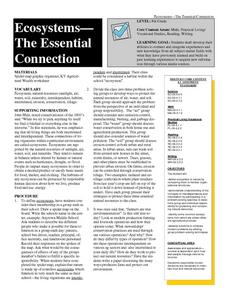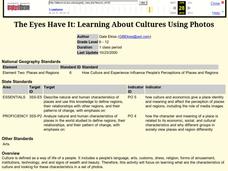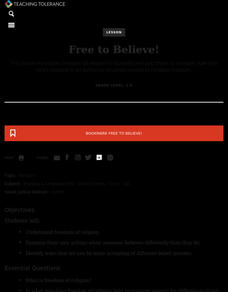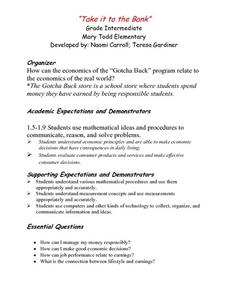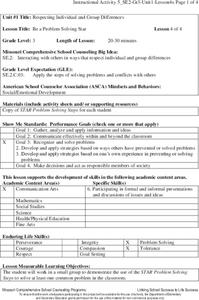Curated OER
Ecosystems-The Essential Connection
Young scholars develop their abilities to solve problems both in school and in a variety of situations similar to that they have encountered in life. They define the term ecosystem in nature by comparing them to familiar organizational...
Museum of Tolerance
Essential Vocabulary and Concepts
Genocide. Scapegoat. Propaganda. Words are powerful. Words carry the weight of history. To prepare for a visit to The Museum of Tolerance, class members consider the weight of meaning in words related to intolerance.
Curated OER
Knowing the Essential Elements of a Habitat
First graders compare their environment with that of Belize by researching via the internet on the sites provided. Students participate in various activities/centers utilizing the information they discovered.
Rainforest Alliance
Knowing the Essential Elements of a Habitat
To gain insight into the many different types of habitats, individuals must first get to know their own. Here, scholars explore their school environment, draw a map, compare and contrast their surroundings to larger ones. They then write...
University of Texas
Essential Reading Strategies for the Struggling Reader
Beneficial for beginning readers, struggling readers, and those in need of review, a set of language arts activities is a great addition to any foundational reading unit. Focusing on phonological awareness, fluency, instructional...
Curated OER
The Eyes Have It: Learning About Cultures Using Photos
Young scholars focus on determining what the characteristics of culture are. They look for these characteristics in a set of photos. They complete a worksheet imbedded in this plan.
Curated OER
Putting Pitch In Its Place
Learners focus on reading musical notations. They see, hear, practice and write notations in the lessons to become more independent readers of music. They complete a Rubric for Pitch Worksheet.
Global Change
The Carbon Cycle and its Role in Climate Change
So how does the carbon cycle work? Kids participate in a hands-on activity that allows them to understand the chemistry behind climate change and global warming. They act out the process of photosynthesis by labeling themselves as...
National Wildlife Federation
It's All in the Name: Weather Versus Climate
What goes up when rain comes down? An umbrella! Activity eight in the series of 12 explores weather and climate. In pairs, participants analyze maps, watch a short video, create a weather forecast, and complete a reading to determine the...
Curated OER
How Toxic Is It?
Students participate in an activity in which they investigate the scientific method and seed germination as well as practice graphing and metric measuring skills. Students examine toxicity by exposing Wisconsin Fast Plants seeds to toxic...
John F. Kennedy Presidential Library & Museum
Picture It: JFK in High School
Elementary schoolers learn about young John F. Kennedy. After a teacher-led discussion about his high school years, pupils examine a photograph of Kennedy and four of his friends taken on the grounds of the Choate School in Connecticut....
Teaching Tolerance
Free to Believe!
The United States: One nation with countless religions. An interesting lesson focuses on the freedom of religion protected under the First Amendment. Academics learn why it is important to protect all religions, why there is a separation...
Fluence Learning
Writing an Opinion: Is Pride Good or Bad?
Does pride really goeth before the fall, or can it be essential to one's development? Second graders read two of Aesop's fables that refer to pride in their morals, and write a short essay about whether pride is good or bad, based on...
Council for Economic Education
Entrepreneurs in Mesopotamia
While ancient Mesopotamia didn't have the TV show "Shark Tank," it was a time of entrepreneurship as workers began to specialize. Both individual workers and the societal structure encouraged individuals to consider how they could...
Teaching Tolerance
Participating in Digital Communities
It's possible to promote inclusion and empathy on the Internet—it just takes effort! Scholars read and discuss a short story about being a friend online. Then, pupils role-play appropriate ways to respond to hate within a digital...
Curated OER
Take It To the Bank
Examine how the economics of a school store relate to real world economics. Elementary students explore various websites, complete a Venn diagram, create a schedule of wages for the students, read the book "A Chair For My Mother" and...
Scholastic
Study Jams! Estimate Whole Numbers
Expand on prior knowledge of place value to teach your class how to round whole numbers. This essential skill is explained with the help of a number line before introducing the explicit rules for rounding numbers up and down. Work...
Carolina K-12
The Great Depression
From Black Tuesday to Hoovervilles and the Dust Bowl, here is a resource that offers a comprehensive overview of the Great Depression. It includes a detailed PowerPoint presentation and guided notes template, activities for analyzing...
Science 4 Inquiry
Monster Mash-Up of Genetics
It's alive! Young mad scientists create monsters as they explore the probabilities of genetic traits during a well-structured inquiry lesson. Pairs travel from station to station, rolling the dice and adding traits to their creations as...
American Battlefield Trust
Civil War Civilian Experience
Imagine what would it have been like to watch a dramatic battle of the Civil War in your own backyard. Young scholars ponder this scenario while looking at firsthand accounts from the Battle of Franklin, along with modern photos of the...
Missouri Department of Elementary
Happy, Sad, Scared and Mad: All Belong To Me
"What are feelings?" and "Why are feelings important to understand?" are the essential questions of a lesson that boosts self-awareness. Scholars discuss the four basic emotions—happy, sad, scared, and mad—in preparation for a creative...
Missouri Department of Elementary
Be a Problem Solving Star
Reach for the STARs! Using the resource, scholars review the STAR (Stop, Think, Act, Review) method and discuss how to use it to solve a math equation. Next, small groups collaborate to solve a common problem in the classroom using the...
Teaching Tolerance
You Are the Product
What does it mean for a product or service to go viral? Scholars explore the topic by reading an article about the economics of social media. After reading, they complete a 3-2-1 data chart with information they learned from the text and...
Teaching Tolerance
News Consumers' Bill of Rights and Responsibilities
Believe it or not, people have rights as new consumers. Scholars read PEN America's News Consumers' Bill of Rights and Responsibilities and work in small groups to paraphrase chosen sections of the text. Next, they create and present...


